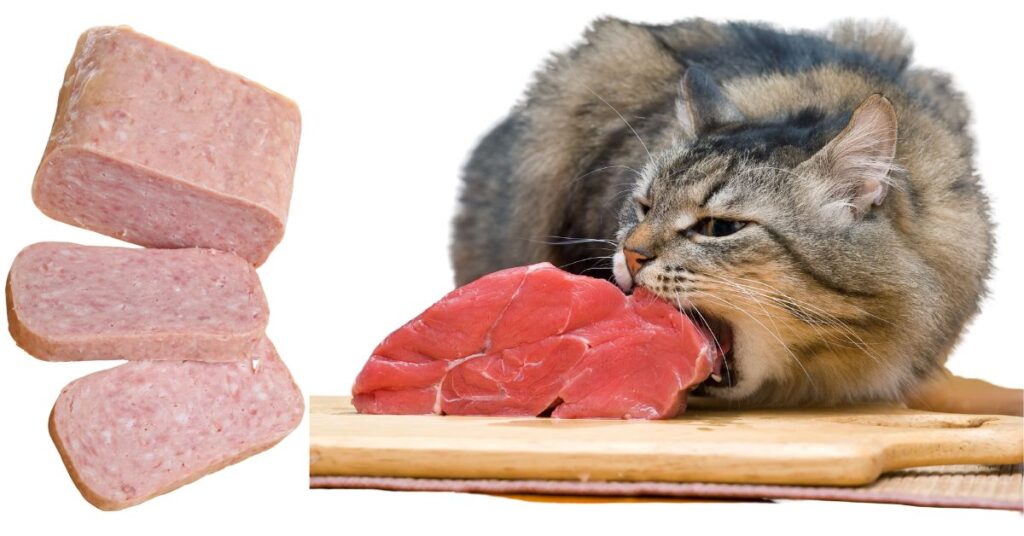As pet owners, we want to ensure our furry friends receive the best possible care and nutrition. However, with so many human foods readily available, it can be tempting to share our favorite treats with our feline companions. One such food that may catch your eye is the iconic canned meat product, Spam.
But before you dive in and offer a slice to your cat, it’s crucial to understand the potential risks and implications. Spam, while a convenient and beloved food for many humans, is not a suitable option for our feline friends due to its high sodium, fat, and preservative content.
There are several reasons why Spam is not recommended for feline consumption.
What is Spam?
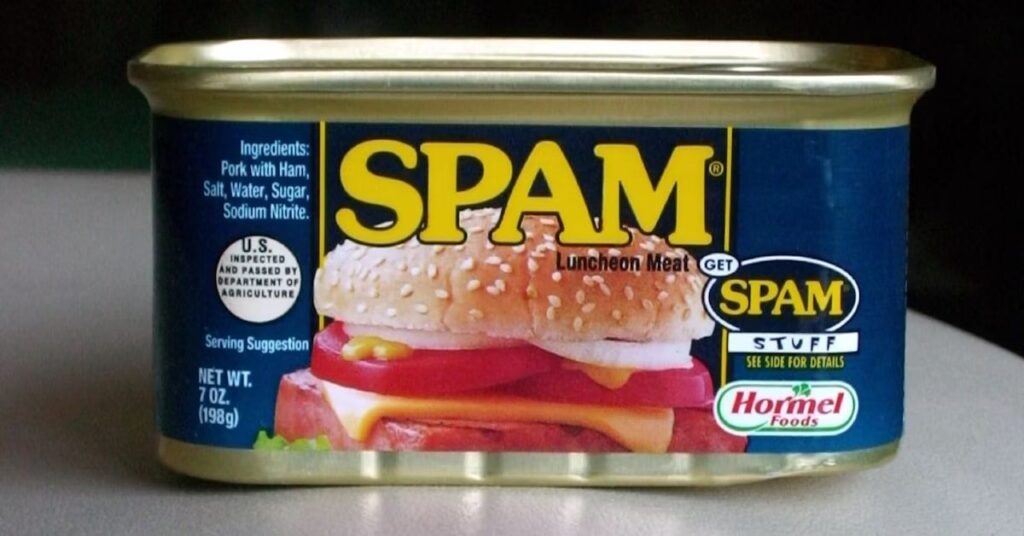
Spam, the iconic canned precooked meat product, has been a pantry staple for decades. Produced by Hormel Foods, Spam is a combination of pork shoulder meat, ham, salt, sugar, and a blend of preservatives. Its long shelf life and versatility have made it a popular food choice for many households. However, when it comes to our feline friends, the question arises: can cats eat Spam?
Can Cats Eat Spam?
Can your whiskered companion indulge in the salty, savory delight that is Spam? The answer isn’t as straightforward as you might think. While cats are carnivores at heart, their dietary needs are quite specific, and not all meats are created equal in their feline world.
Spam, the iconic canned meat treat, presents a bit of a conundrum. Its processed nature and human-centric ingredients raise some concerns when it comes to feline nutrition. The high sodium and fat content in Spam can spell trouble for your cat’s delicate digestive system and overall well-being.
While the occasional accidental nibble may not send your furry friend into a health tailspin, Spam is far from an ideal dietary choice for cats. Its tempting aromas might pique your kitty’s curiosity, but the nutritional mismatch and potential health risks should give you pause before sharing your beloved canned meat.
Veterinary experts emphasize the importance of a balanced, species-appropriate diet for our feline companions. Spam’s allure may be strong, but prioritizing your cat’s long-term health and well-being should take precedence over any temporary treat temptations.
Read this blog: How to Make Your Cat Throw Up: A Comprehensive Guide
Risks of Feeding Spam to Cats
High Sodium Content
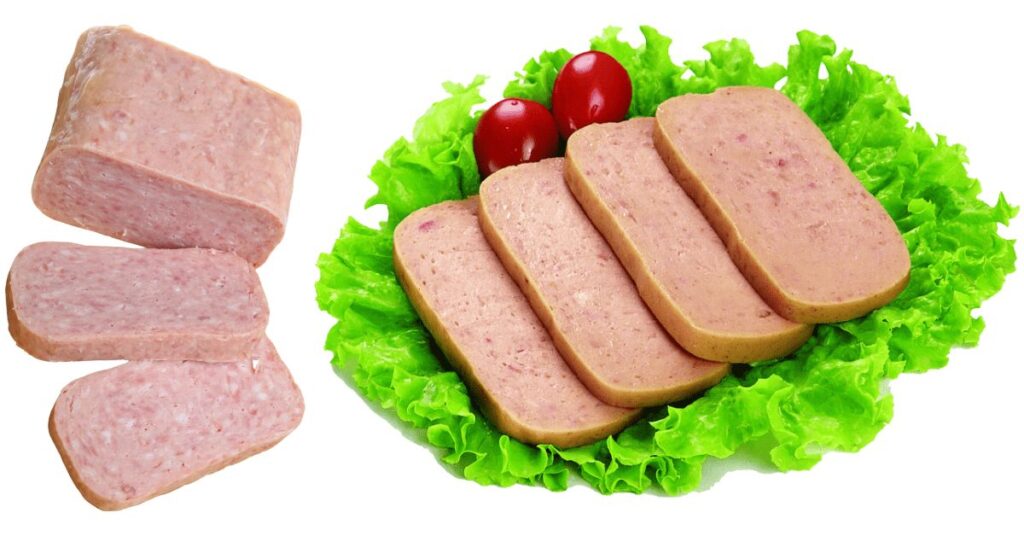
Spam is incredibly high in sodium, with a single 2-ounce serving containing a staggering 790 milligrams of sodium. This amount constitutes over 30% of the recommended daily intake for humans, which is 2,300 milligrams of sodium per day. However, cats have a much lower sodium requirement than humans, and consuming excessive amounts of salt can lead to various health issues.
Dehydration: Excessive sodium intake can cause increased thirst and urination in cats, leading to dehydration. Dehydration can be particularly dangerous for felines, as it can quickly lead to other severe complications, such as kidney problems and electrolyte imbalances.
Kidney Problems: High sodium levels can put unnecessary strain on a cat’s kidneys, potentially leading to kidney disease or even kidney failure. Cats with pre-existing kidney issues are especially vulnerable to the adverse effects of excessive sodium intake.
Sodium Ion Poisoning: In severe cases, excessive sodium intake can lead to sodium ion poisoning, a potentially life-threatening condition. Symptoms of sodium ion poisoning in cats may include vomiting, diarrhea, lethargy, seizures, and even coma.
High Fat Content
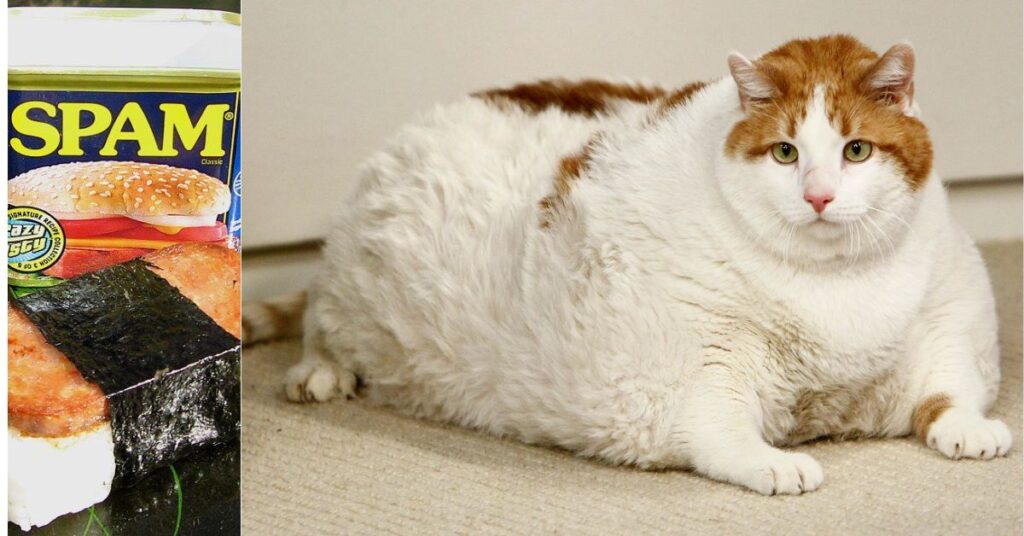
Spam is also high in fat, with a single 2-ounce serving containing approximately 16 grams of fat, which accounts for over 30% of the recommended daily intake for humans. While cats are obligate carnivores and require a moderate amount of fat in their diet, the type of fat found in Spam is not ideal. The high saturated fat content can lead to several health issues in felines.
Obesity: Excessive fat intake can cause weight gain and obesity in cats, which can lead to other health problems such as diabetes, joint issues, and respiratory difficulties. Obese cats are also at a higher risk of developing various other health complications, including heart disease and certain types of cancer.
Pancreatitis: High-fat foods like Spam can increase the risk of pancreatitis in cats, a painful and potentially life-threatening condition. Pancreatitis is an inflammation of the pancreas, which can cause severe abdominal pain, vomiting, and other debilitating symptoms.
Preservatives and Additives
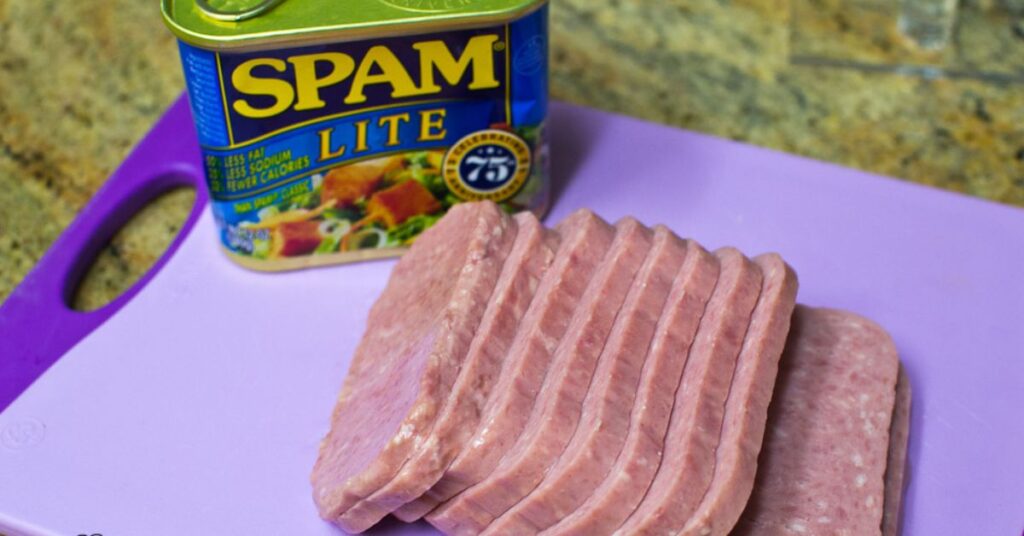
In addition to its high sodium and fat content, Spam contains various preservatives and additives that can be harmful to cats. These include:
Nitrites: Spam contains sodium nitrite, a preservative used to extend the shelf life and enhance the color of the meat. Nitrites have been linked to an increased risk of certain cancers in humans, and they may have similar effects on cats.
Artificial Flavorings: Many artificial flavorings used in Spam, such as monosodium glutamate (MSG) and artificial smoke flavors, are not meant for feline consumption and may cause digestive issues or other adverse reactions in cats.
Safe Alternatives to Spam
Instead of feeding your cat Spam, it’s best to provide them with a high-quality, balanced diet formulated specifically for their nutritional needs. Some safe and healthy alternatives to Spam for cats include:
Commercial Cat Food: High-quality commercial cat foods, whether wet or dry, are formulated to meet a cat’s nutritional requirements. These foods are carefully balanced to provide the right amounts of proteins, fats, carbohydrates, vitamins, and minerals that cats need for optimal health.
Cooked Lean Meats: Cats can enjoy small amounts of cooked lean meats such as chicken, turkey, or fish as an occasional treat. It’s essential to cook these meats thoroughly and avoid seasoning them with salt, spices, or other additives that can be harmful to your cat’s health.
Cat-Safe Treats: Look for treats specifically designed for cats, which are free of harmful ingredients and provide a balanced nutritional profile. These treats can be used as rewards or occasional snacks but should not make up a significant portion of your cat’s daily caloric intake.
By providing your cat with a high-quality, balanced diet and incorporating safe and healthy treats and supplements, you can ensure they receive the proper nutrition they need to thrive. Always consult with your veterinarian or a qualified pet nutritionist if you have any concerns or questions about your cat’s dietary needs.
Also Read This Blog: How Long Can a Cat Stay on Antibiotics? A Comprehensive Guide
Frequently Asked Questions (F.A.Q.)
Can cats eat raw Spam?
No, cats should not eat raw Spam. Raw pork products can harbor harmful bacteria, such as Salmonella and Trichinella, which can make both cats and humans sick.
Can cats eat cooked Spam?
While cooking Spam may reduce the risk of bacterial contamination, it does not eliminate the other potential risks associated with its high sodium, fat, and preservative content. It’s best to avoid feeding cooked Spam to cats altogether.
Can a small amount of Spam harm my cat?
Even a small amount of Spam can be harmful to your cat’s health. Due to their smaller size and different nutritional requirements, cats are more susceptible to the negative effects of the high sodium, fat, and preservatives found in Spam.
Are there any benefits to feeding cats Spam?
No, there are no significant benefits to feeding cats Spam. Spam does not provide any essential nutrients that cannot be obtained from a balanced, high-quality cat food or safe treat alternatives.
How should I respond if my cat accidentally eats Spam?
If your cat accidentally consumes a small amount of Spam, monitor them closely for signs of digestive upset, such as vomiting or diarrhea. If they seem unwell or continue to experience symptoms, contact your veterinarian immediately.
Is Spam ok for cats to eat?
No, Spam is not a suitable or safe food for cats to consume regularly. It is high in sodium, fat, and preservatives, which can lead to various health problems.
Can pets have Spam?
While some pets, such as dogs, may be able to tolerate small amounts of Spam occasionally, it is generally not recommended due to the potential health risks associated with its high sodium, fat, and preservative content.
What canned meat can cats eat?
Cats should not be fed canned meats intended for human consumption, as they often contain high levels of sodium, fat, and preservatives. Instead, opt for high-quality, commercially prepared canned cat foods or cooked lean meats as an occasional treat.
Can cats and dogs have Spam?
No, Spam is not recommended for either cats or dogs. While dogs may be able to tolerate small amounts occasionally, it is not a suitable regular food source for either species due to its high sodium, fat, and preservative content.
How toxic is Spam?
Spam itself is not toxic or poisonous when consumed in moderation by humans. However, for cats and other pets, the high levels of sodium, fat, and preservatives found in Spam can be potentially harmful and may lead to various health issues.
Wrapping Up
While Spam may be a beloved and convenient food choice for humans, it is not a suitable or safe option for our feline companions. Cats have specific nutritional requirements that cannot be met by Spam, and the high levels of sodium, fat, and preservatives found in this canned meat product can lead to various health problems.
Instead of feeding your cat Spam, it’s best to provide them with a high-quality, balanced diet formulated specifically for their needs. Additionally, occasional treats should be limited to those designed for cats or small amounts of cooked lean meats.
Remember, your cat’s health and well-being should always be the top priority. If you have any concerns or questions about your cat’s diet or nutrition, it’s best to consult with a veterinarian or a qualified pet nutritionist.

Jackson is a seasoned professional in the field of pets, boasting four years of enriching experience. His expertise spans pet care, training, and health, ensuring insightful and reliable content for pet enthusiasts on our site.

